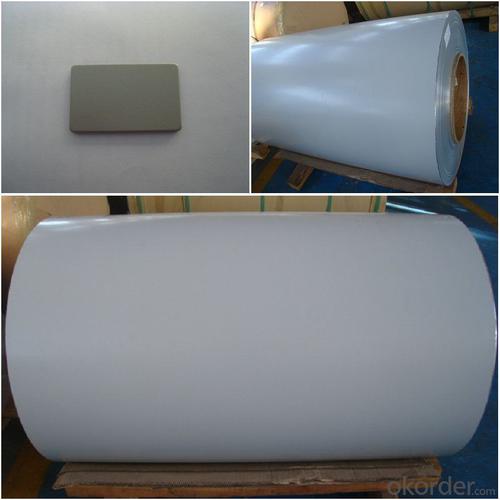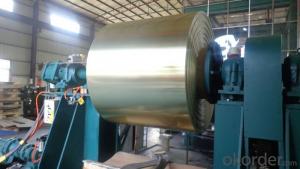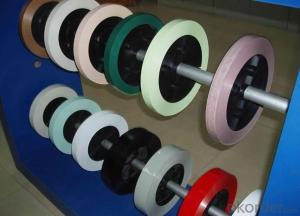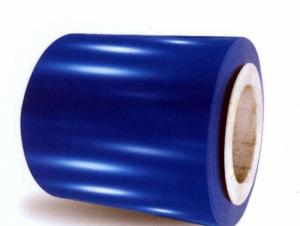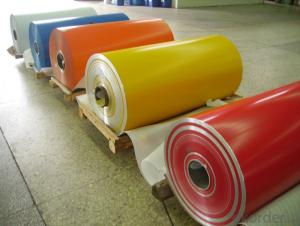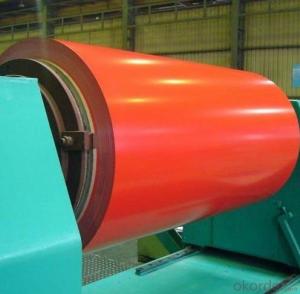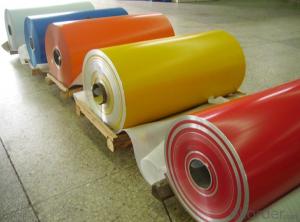High-Quality Aluminum Coils PVDF Coated Aluminum Coils 3003 H16 for Aluminum Composite Panels
- Loading Port:
- Yantai
- Payment Terms:
- TT OR LC
- Min Order Qty:
- 7 m.t
- Supply Capability:
- 200 m.t/month
OKorder Service Pledge
OKorder Financial Service
You Might Also Like
Specification
1. Structure of PVDF Coated Aluminum Coils 3003 H16 with High Quality Used for Aluminum Composite Panels
Color coated aluminum coils are widely used for aluminum composite panels. We normally use alloy 3003 and temper H16.
We have different colors for aluminum composite panels. RAL numbers are no problem for us. We also can adjust coating according to color of customers and offer personalized services.
2. Main Features of PVDF Coated Aluminum Coils 3003 H16 with High Quality Used for Aluminum Composite Panels
• Light Weight
• Good in strength and rigidity
• High Flatness
• Good Weathering
• Colorful
• Recycling
• Saving Energy
• Rust proof
3. PVDF Coated Aluminum Coils 3003 H16 with High Quality Used for Aluminum Composite Panels Images
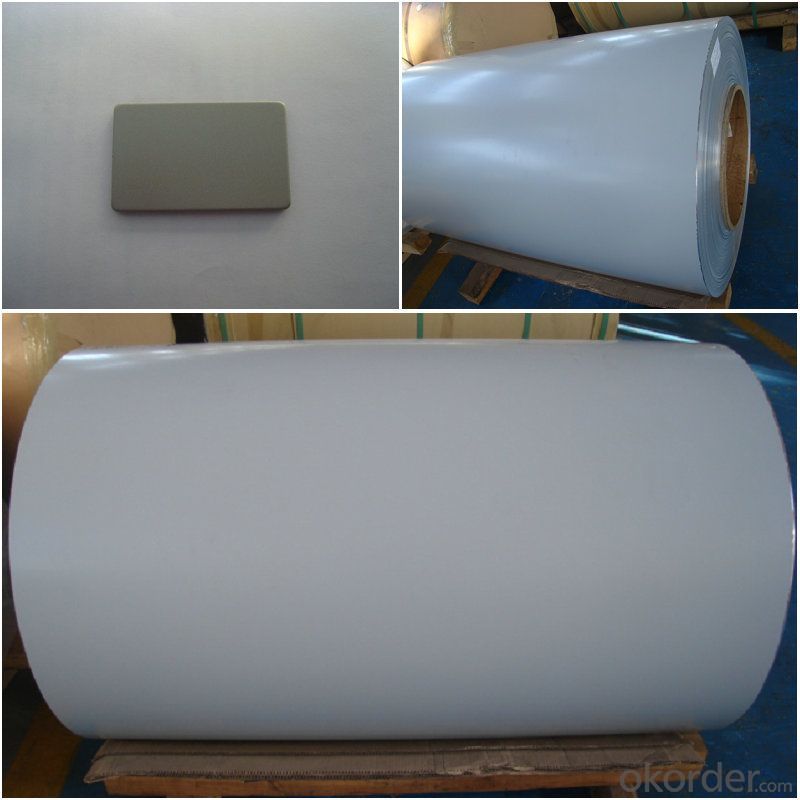
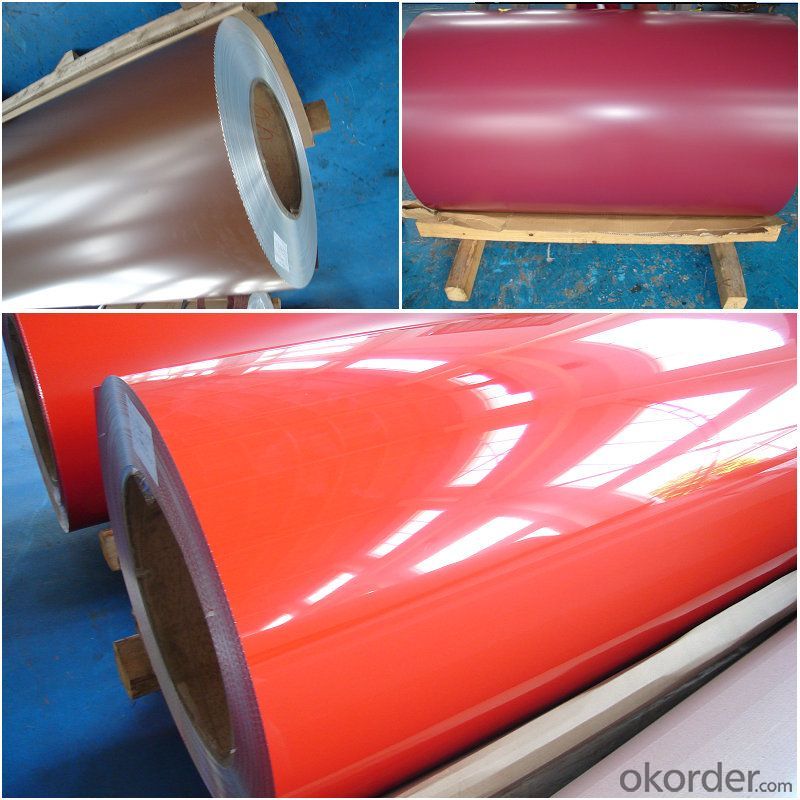
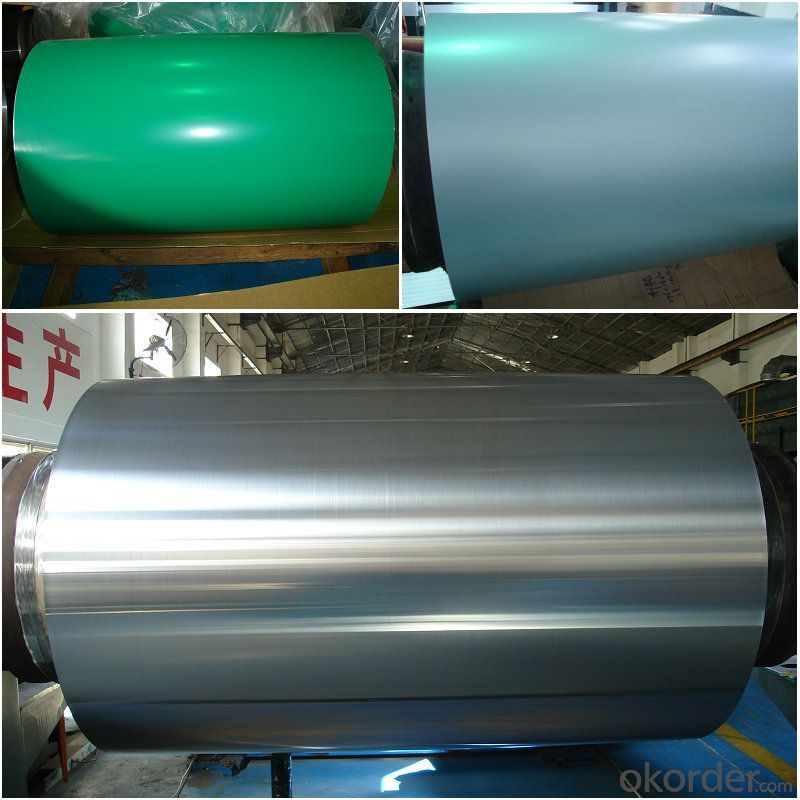
4. Specification of PVDF Coated Aluminum Coils 3003 H16 with High Quality Used for Aluminum Composite Panels
ALLOY | TEMPER | THICKNESS | WIDTH | COATING and COLOR |
3003, 3105, etc | H44, etc | 0.2-0.6mm | Less than1600mm | AS PER YOUR REQUIREMENTS |
5. FAQ
A.What about inspections to guarantee quality?
For each order, we will arrange strict inspection for raw materials, inspection during production and inspection for finished goods.
With requirement of customers, we also can arrange the third party inspection.
B.What about delivery?
We will put order in production schedule after order gets confirmed against copy of TT or L/C. Normally it takes about one month for production. Exact shipment schedule is different based on different sizes and quantity.
C.What is the MOQ?
5 tons for each size.
D. Where have you exported?
We have exported to many countries. Main markets include South East Asia, Middle East, North America, South America, etc.
- Q: This question asks about potential health hazards associated with the use of aluminum coils.
- <p>There are concerns regarding the use of aluminum coils, particularly in cooking and food preparation, due to the potential for aluminum to leach into food. While aluminum is generally recognized as safe, excessive intake over a long period has been linked to various health issues, including neurological disorders and cognitive impairment. However, the risk is considered low for most people, as the body does not absorb a significant amount of aluminum from food or cookware. It's important to note that the scientific community has not reached a consensus on the extent of these risks, and further research is needed. To minimize potential exposure, it's recommended to use alternative cookware materials like stainless steel or cast iron, especially for acidic foods that may increase aluminum leaching.</p>
- Q: i need ONE advantage of each, and a final reason why aluminium is used?
- Copper does conduct slightly better than aluminum, but aluminum corrodes over time and the oxidized surface has very high resistance. Copper also oxidizes but is not as high a resistance. The high resistance, when in contact with another conductor, like a junction inside a box, will create heat. Those high resistance junctions create so much heat that over time a fire hazard develops. Hence, National Electrical Code disallowed the use of aluminum for safety reasons.
- Q: What is the maximum width-to-thickness ratio for aluminum coils?
- The maximum width-to-thickness ratio for aluminum coils depends on various factors, including the specific alloy, temper, and intended application. Aluminum coils are commonly used in industries such as construction, automotive, and packaging, where different width-to-thickness ratios may be required. In general, the width-to-thickness ratio for aluminum coils typically ranges between 100:1 to 200:1. However, it is important to note that this range can vary based on the specific alloy and temper. Thicker coils may have a lower width-to-thickness ratio, while thinner coils can have a higher ratio. High-strength alloys, such as those used in aerospace applications, may have lower width-to-thickness ratios due to their increased strength requirements. Conversely, coils used in less demanding applications may have higher width-to-thickness ratios. It is crucial to consult the relevant industry standards, specifications, or manufacturer guidelines to determine the appropriate width-to-thickness ratio for a specific aluminum coil. These guidelines consider the intended use, mechanical properties, and performance requirements, ensuring that the coil is suitable for its intended application while maintaining structural integrity and functionality.
- Q: I was told today that taking aluminium inside your body greatly increases the chance of getting alzheimers as they destroy cells. Is this true?If so, then what foods contain aluminium?Thanks in advance :)
- It has been hypothesized that aluminium exposure is a risk factor for the development or acceleration of onset of Alzheimer disease (AD) in humans. The Aluminium could be found in bottled or treated tap drinking water and food additives. Aluminium is permitted as a food additive and is used in colourings, emulsifiers, stabilisers and anti-caking agents. Example of food containing aluminium additives includes processed cheese.
- Q: Can aluminum coils be used in refrigeration systems?
- Yes, aluminum coils can be used in refrigeration systems. Aluminum is a popular choice for coil materials in refrigeration systems due to its excellent heat transfer properties and corrosion resistance. Aluminum coils are lightweight, durable, and efficient in transferring heat, making them suitable for use in various refrigeration applications such as air conditioning units, refrigerators, and freezers. Additionally, aluminum coils are easier to shape and install compared to other materials, making them a preferred choice for manufacturers.
- Q: Can aluminum coils be used in the production of aircraft fuel tanks?
- Aluminum coils, with their lightweight and durable nature, find application in the creation of aircraft fuel tanks. They are commonly employed in the aerospace industry due to their impressive strength-to-weight ratio. Furthermore, their corrosion-resistant properties make them an ideal choice for fuel tanks, as they can withstand the harsh conditions and chemicals present in aviation fuel. The utilization of aluminum coils enables efficient manufacturing processes, as they can be easily shaped and welded into the desired tank form. Moreover, aluminum possesses excellent thermal conductivity, aiding in the dissipation of heat generated during flight and preventing fuel overheating. In conclusion, aluminum coils are a fitting and extensively utilized material in the production of aircraft fuel tanks.
- Q: Hi,I am fairly new to design and have been doing technical drawing for only a few months. We have an item, that supports up to about 800KG of weight, as a C shaped channel. We are currently making this out of 3mm Mild Steel. Due to a new design, we are changing this design to avoid welding and painting the above part. This means we will be making the part from Galv sheet.I would like to make the part from Aluminium because 1) There will be no rust, 2) I think it will look better than Galv sheet but I need to keep the cost down.We use 3mm mild at the moment, because it is easier to weld than 2mm, not for strength really.Therefore, my question is, in everybody's opinion, would it be OK to make it from 2mm Aluminium, or is this likly to end in disaster?FYI, the part is 1600mm long, then on each long side there are presses of up 250mm, down 80mm and down 20mm. The weight is supported at 4 points on the 80mm flanges.What a question for my first go Answers! TIA
- Aluminium is expensive as far as I know. I would do the costing on the aluminium first. Also aluminium is a little weaker so you'll need a thicker sheet. I would go with galvanised.
- Q: This question asks about the maintenance difficulty of aluminum coils.
- <p>Aluminum coils are relatively easy to maintain. They are resistant to corrosion and do not require frequent cleaning or special treatments. Regular inspection for any physical damage or signs of wear is sufficient. However, it's important to keep them dry and clean to prevent any potential issues. For specific applications, such as in HVAC systems, regular cleaning may be necessary to ensure optimal performance. Overall, maintenance is minimal compared to other materials.</p>
- Q: The heat of fusion of aluminum is 3.95kj/g. What is the molar heat of fusion of aluminum? What quantity of energy is needed to melt 10.0g of aluminum? What quantity of energy is required to melt 10.0 mol of aluminum? Three questions i need help with can someone show me step by step please so i can get it thank you a bunch
- This Site Might Help You. RE: heat of fusion of aluminum? The heat of fusion of aluminum is 3.95kj/g. What is the molar heat of fusion of aluminum? What quantity of energy is needed to melt 10.0g of aluminum? What quantity of energy is required to melt 10.0 mol of aluminum? Three questions i need help with can someone show me step by step please so i can...
- Q: What are the necessary safety measures to be taken while handling and using aluminum coils?
- <p>When using aluminum coil, safety precautions include wearing appropriate personal protective equipment such as gloves and safety glasses to prevent cuts and eye injuries. Ensure good ventilation to avoid inhaling aluminum dust or fumes. Keep the work area clean and free from clutter to prevent tripping hazards. Use proper tools to handle the coils to avoid strain or injury. Be cautious of electrical hazards if the aluminum coil is being used in conjunction with electrical equipment. Always follow the manufacturer's guidelines for safe operation and storage of aluminum coils.</p>
Send your message to us
High-Quality Aluminum Coils PVDF Coated Aluminum Coils 3003 H16 for Aluminum Composite Panels
- Loading Port:
- Yantai
- Payment Terms:
- TT OR LC
- Min Order Qty:
- 7 m.t
- Supply Capability:
- 200 m.t/month
OKorder Service Pledge
OKorder Financial Service
Similar products
Hot products
Hot Searches
Related keywords



